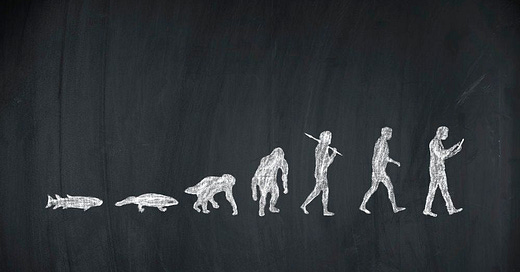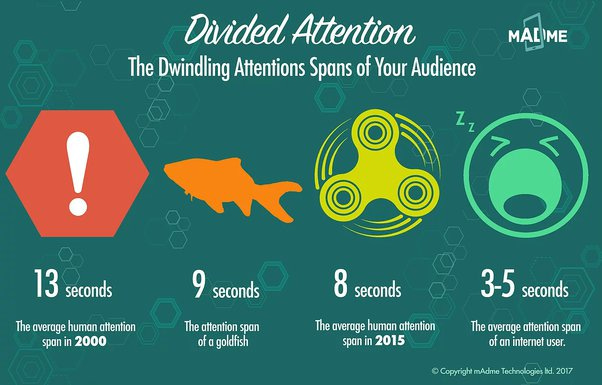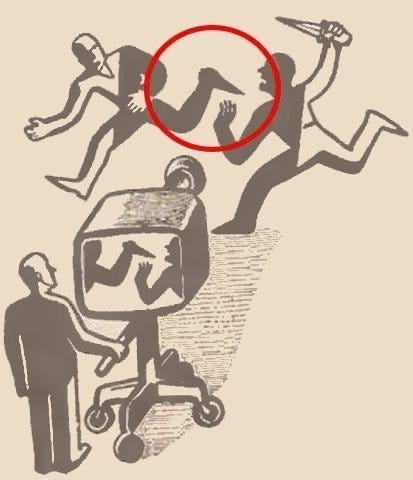The Great Disconnect: How Technology Is Eroding Human Consciousness
From information overload to spiritual vacuum: How our quest for digital connection is creating a crisis of human consciousness
We stand at a crucial threshold - not of advancement, but of ending. While headlines trumpet humanity's supposed march toward technological triumph - Mars colonization, electric vehicle revolutions, artificial intelligence breakthroughs - a more subtle but profound regression is underway. Our intellectual capacity, once driven by an insatiable quest for knowledge and inner truth, is dissipating at an alarming rate.
This isn't merely about technological progress or its absence. Rather, it's about the fundamental way humans engage with discovery and understanding. The very qualities that drove human advancement - genuine curiosity, sustained attention, deep engagement with ideas - are fading from our collective consciousness. The sheer irony is that, even as we dream of conquering new frontiers, we're losing our ability to fully comprehend our immediate reality. For every technological leap forward, we're taking two steps backward in our fundamental human capabilities.
This regression isn't immediately obvious precisely because technology masks it so effectively. The sophisticated veneer of digital advancement creates an illusion of progress while our core intellectual functions deteriorate beneath the surface. We find ourselves in the peculiar position of being simultaneously more informed and less wise, more connected and less understanding, more capable and less discerning.
The Anatomy of Attention
Understanding our declining attention spans begins with understanding attention itself. The word's etymology reveals a crucial insight: 'attention' combines 'at' and 'tension,' suggesting that focused awareness requires a kind of productive tension - a deliberate strain that allows our minds to engage deeply with ideas and tasks.
This natural tension is fundamental to human consciousness. Our minds are designed to focus intensely on one thing at a time, allocating significant neural resources to maintain this focus. It's a delicate balance: too little tension and we can't concentrate; too much and we become rigid and anxious. This balance, once innate to human cognition, is now under unprecedented assault.
Modern technology has fundamentally disrupted this natural attention mechanism. The immediacy it provides creates an insidious illusion: that every fleeting thought deserves immediate expression, that every notification demands instant response. Each digital interaction opens a mental channel that never fully closes, creating endless loops of partial attention. Instead of completing thoughts or tasks, we accumulate layers of fractured consciousness.
The modern mind now depends on regular notification "fixes" - those tiny dopamine hits that arrive every few minutes, masking an underlying nervous boredom. We're rarely present in our bodies, rarely centered in our immediate experience. Our capacity for focused attention is continuously hijacked by algorithmically designed rewards - a system that doesn't enhance our uniqueness but rather promotes a kind of cognitive homogenization.
What we celebrate as "multitasking" is actually attention fracturing - a frantic mental ping-pong that prevents deep engagement with any single task. Our awareness is constantly disrupted by an endless array of pings, dings, and notifications, each one pulling us further from meaningful engagement. We find ourselves caught in a vicious cycle where the very devices that fragment our attention become our desperate remedy for that fragmentation - though they never actually provide the focus we seek.
The Human Tetris Game: Modern Life as Endless Task Management
Modern humans have transformed themselves into living pieces in what can only be described as a perpetual Human Tetris Game. Unlike the classic video game where blocks fall into place to create order, in this real-world version, we are both the players and the pieces, frantically trying to fit ourselves into ever-shifting patterns dictated by technology's relentless rhythm.
The game's rules are programmed into us through algorithms of instant communication, creating an artificial urgency that reshapes our relationship with time and task completion. We're conditioned to believe that every moment must be filled, every notification answered, every task immediately addressed. The next item on our endless list beckons before we've properly completed the current one, creating an illusion of productivity that masks a deeper inefficiency.
Watch any professional environment: people frantically juggling multiple tasks, rushing to clear their inboxes, scheduling meetings about meetings, all while responding to an endless stream of messages. The goal has shifted from meaningful completion to rapid task elimination - from quality to quantity, from depth to speed. We've become expert score-keepers of productivity metrics that measure everything except actual value creation.
The common belief today is that sending a text message or firing off a quick email constitutes completion of a task. We feel absolved of responsibility once we've moved something from our mental inbox to someone else's. But this isn't genuine completion - it's merely shifting blocks around the game board, creating new patterns of incompletion that someone else must address.
The most insidious aspect of this game is its self-perpetuating nature. The faster we move, the more we feel we must move faster still. The more tasks we complete, the more tasks seem to appear. The game never ends because we've programmed our world - and ourselves - to prevent ending. There is no win condition in this version of Tetris, only an endless cycle of acceleration and accumulation.
The Communication Crisis
The deterioration of human communication represents perhaps the most profound paradox of our technological age. In an era of unprecedented connectivity, we face a crisis of clarity. The tools that promised to enhance our ability to connect and communicate have instead created a new form of isolation, wrapped in the illusion of connection.
This communication breakdown manifests in multiple dimensions. Most immediately, we see it in the shrinking of individual vocabulary - the average person now actively uses merely a couple hundred words, a fraction of our linguistic potential. But this impoverishment goes beyond mere word count. We're witnessing the standardization of human expression, where original thought gives way to recycled phrases, where credibility comes not from authentic insight but from the ability to quote others. We've created a culture that rewards conformity in expression while discouraging the development of unique voices.
More fundamentally, we're losing the art of listening. Modern interaction has become a performance of attention rather than its practice. In professional settings, in personal relationships, even in crucial political discourse, we see people mastering the appearance of engagement while remaining fundamentally disconnected. The consequences extend far beyond individual interactions. When a society loses its ability to communicate clearly, it loses its ability to identify and solve problems effectively.
This fractured communication transforms even simple exchanges into prolonged, inefficient processes. What could be a brief, focused conversation becomes a day-long series of interrupted textual exchanges, each gap increasing the potential for misunderstanding and projection. The tragedy isn't just in the inefficiency - it's in the growing inability to recognize the problem itself. We mistake increased communication volume for improved communication quality, confusing the speed of message transmission with the depth of understanding.
The Data Delusion
Technology's role in human regression reveals itself most powerfully in our relationship with data and information. The data itself has become our new golden calf - an object of worship that we believe will solve all problems if we just collect enough of it. But this faith in data often blinds us to a crucial truth: information without wisdom, without presence, without human discernment, becomes another form of noise.
The COVID-19 pandemic provides a stark illustration of how fundamentally technology has transformed not just our access to information, but our very perception of reality. Consider the contrast with previous epidemics. The difference isn't in the nature of these threats, but in our technological context. In prior epidemics, the natural limitations on information flow served as an unintended protection against mass panic. Without smartphones, instant video sharing, and social media, information moved at a pace that allowed for processing and perspective.
Today's landscape is radically different. We're plugged into a 24/7 stream of data that doesn't just inform us - it shapes our consciousness. The constant flow of information creates a new kind of vulnerability: our attention becomes perpetually hijacked by whatever threat is currently trending. When we're continuously reminded about our chances of dying from a virus, a car accident, or even a freak incident, these statistical possibilities stop being abstract numbers and become ever-present threats in our minds. We become handicapped not by the threats themselves, but by our obsessive awareness of them.
This dynamic explains how easily a 0.01% threat can be perceived as a 99% certainty. The constant repetition of information, amplified by our technology-driven echo chambers, distorts our ability to assess risk rationally. We've created systems of unprecedented complexity while simultaneously degrading our capacity to understand and manage them effectively.
The Societal Implications
When billions of individuals, each operating in a state of partial attention and digital dependence, make decisions based on fragmented information and reactive impulses, they create a collective confusion that no individual leader or institution can effectively counter. This explains why seeking villains - whether political leaders, corporations, or "global elites" - misses the point entirely. The dysfunction we witness in our institutions and economies isn't primarily the result of individual malice or incompetence, though these certainly exist.
No one is truly present anymore. No one is genuinely engaged. This isn't hyperbole - it's the logical endpoint of our collective disengagement. When individuals perpetually exist in a state of partial attention, when we multiply this fractured consciousness by billions, we create a centripetal force dispersing human energy and resources in countless directions. At this critical mass of disengagement, genuine progress becomes impossible. We reach a standstill masked by the illusion of movement.
The world is actively regressing, though technology provides a sophisticated veneer that obscures this fundamental decline. We ourselves become the architects of our own oppressions, creating systems and responses that further distance us from reality rather than helping us engage with it more effectively.
The Path Through Chaos
Despite this sobering assessment of our technological predicament, there is a way forward. However, it's not found in collective solutions or technological fixes. The solution isn't in fighting technology or attempting to change things at a collective level. Rather, it lies in developing the capacity to move through this erratic and confused world without friction, starting from within oneself.
Most people today can't sit quietly with themselves for even ten minutes - a reality that will have devastating consequences when our technological scaffolding inevitably faces disruption. Consider what will happen when there will be no internet access or no electricity? We'll witness a generation so dependent on digital stimulation jump off balconies and rooftops en masse. All, because they've never had genuine spiritual fulfillment. Their only conception of "spiritual" experience has been the daily genuflection to social media platforms.
The stakes couldn't be higher. Our children and their children will inherit a dysfunctional planet shaped by humanity's communication breakdown and collective misunderstandings. Yet the solution remains surprisingly simple, though not easy: cultivating individual awareness. When we develop the power of attention, we can accomplish more meaningful work than any amount of distracted multitasking could achieve.
This understanding, therefore, becomes particularly crucial when we consider future generations. Parents must recognize their responsibility to offer children engaging activities that develop both intelligence and spirit independent of technology. While technology itself isn't evil - a smartphone only becomes a "dumbphone" in unconscious hands - early dependency on digital tools can have profound adverse effects on development.
This isn't about rejecting technology. Technology itself is neutral - neither good nor evil. The issue lies in our relationship with it, particularly our growing dependency. As this dependency increases, it becomes ever more crucial to 'fill the cup' with rewarding activities for the spirit - pursuits that can travel with us anywhere and remain independent of digital tools.
This begins with the cultivation and preservation of attention - a practice that requires both mental and physical discipline. The human mind is an extraordinary gift, but when our physiology is imbalanced, it becomes our greatest adversary. Without a healthy, balanced body, we cannot maintain a clear, focused mind capable of genuine seeing. We're not here to view reality through veils of distraction or to become homogenized versions of ourselves. We're here to see uniquely, to develop our individual capacity for awareness.
Contrary to modern misconceptions, true multitasking means bringing full attention to one task until its natural completion before moving to the next. It's about maintaining uninterrupted focus through the beginning, middle, and end of each endeavor. This approach leads to greater accomplishment in terms of quality than the fractured attention patterns celebrated in today's culture.
The path through this chaos begins and ends with individual awareness. Everything begins and ends with awareness. Everything begins and ends with the individual human. This isn't just a philosophical statement - it's a practical truth about human development and potential. In a world racing toward increasing fragmentation and confusion, the cultivation of individual awareness becomes not just a personal choice but a responsibility to our collective future.
In a world that goes to sleep, the only healthy way forward is through yourself - through the development of your own awareness, attention, presence, grounding and authentic engagement with life.










